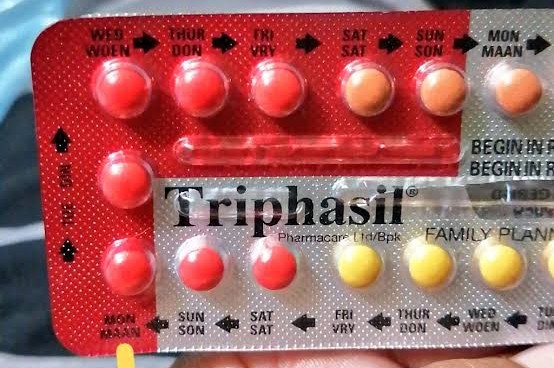Triphasil Pills: Uses, Benefits, Dosage, Side Effects, Interactions

What are Triphasil pills used for?
Triphasil is an oral contraceptive (birth control) pill that contains two active ingredients: ethinyl estradiol and levonorgestrel. Ethinyl estradiol is a synthetic form of the female hormone estrogen, while levonorgestrel is a synthetic form of the female hormone progesterone.
Combined oral contraceptives like Triphasil work by suppressing ovulation, the release of an egg from the ovary, in order to prevent pregnancy. These pills also cause changes in the cervical mucus and the lining of the uterus, making it more difficult for sperm to reach the egg and for a fertilized egg to implant itself in the uterus.
Triphasil was developed by Wyeth Pharmaceuticals, a subsidiary of Pfizer. It was first approved by the U.S. Food and Drug Administration (FDA) in 1984 as a birth control method for women.
Since its introduction, Triphasil has been used by millions of women worldwide as a reliable form of contraception. Over the years, several generic versions of Triphasil have been developed, containing the same active ingredients but marketed under different brand names.
Benefits of Triphasil birth control pills
Triphasil birth control pills, like other combined oral contraceptives, offer several benefits to individuals who choose to use them as a method of contraception. These benefits include:
1. Highly effective contraception: When taken correctly and consistently, Triphasil is a highly effective form of contraception, with a failure rate of less than 1% with perfect use. It provides reliable protection against unintended pregnancy.
2. Regulation of menstrual cycles: Triphasil helps regulate and control menstrual cycles. It can reduce menstrual cramps, make periods lighter and more predictable, and may help alleviate symptoms of premenstrual syndrome (PMS).
3. Reduction in acne: Triphasil, due to its hormonal composition, can help improve acne in some individuals. It can reduce the frequency and severity of breakouts and promote clearer skin.
4. Decreased risk of certain cancers: The use of combined oral contraceptives like Triphasil has been associated with a decreased risk of ovarian and endometrial cancers. These protective effects can last for several years after discontinuing the pill.
5. Management of menstrual-related symptoms: Triphasil can help manage symptoms associated with hormonal imbalances, such as heavy or irregular periods, mood swings, bloating, and breast tenderness.
6. Convenient and reversible: Triphasil is a convenient method of contraception that is easily reversible. Once you stop taking the pills, fertility typically returns quickly, allowing for pregnancy if desired.
It’s important to note that the use of Triphasil or any other contraceptive method should be discussed with a healthcare professional who can provide personalized advice based on your individual health history and needs. They can help you determine the most appropriate method of contraception and discuss any potential risks or side effects specific to your situation.
How to take Triphasil contraceptive pills?
It is important to adhere to your doctor’s prescribed instructions when taking Triphasil. Follow the directions on your prescription label and avoid taking the medication in larger or smaller amounts or for a longer duration than recommended.
To initiate the pill regimen, take your first Triphasil pill on the first day of your menstrual period or on the first Sunday following the start of your period. Initially, it may be necessary to use additional contraception methods such as condoms or spermicides. Always follow your doctor’s instructions in this regard.
Take one pill daily, making sure not to exceed a 24-hour interval between doses. Begin a new pack the day after completing the current one to ensure continuous protection against pregnancy. Refill your prescription before running out of pills entirely to avoid any gaps in usage.
Some packs of Triphasil include seven “reminder” pills, which help maintain your regular menstrual cycle. Typically, your period will commence while taking these reminder pills.
If you experience severe vomiting or diarrhea, use additional backup birth control methods as these conditions may affect the pill’s effectiveness.
During the initial three months of using Triphasil, breakthrough bleeding may occur. Inform your doctor if this bleeding persists or becomes unusually heavy.
If you anticipate undergoing major surgery accompanied by prolonged bed rest, you may need to temporarily discontinue Triphasil usage. Ensure that any healthcare professional or surgeon treating you is aware that you are using this medication.
While taking Triphasil, it is crucial to keep up with regular doctor’s appointments to monitor your health and discuss any concerns or questions you may have.

When is the best time to take Triphasil?
The best time to take Triphasil is determined by following the instructions provided by your doctor or the information provided with your prescription. In general, you should take one Triphasil pill daily, at the same time each day, without exceeding a 24-hour interval between doses.
To initiate Triphasil, you can choose to start the first pill on the first day of your menstrual period or on the first Sunday following the start of your period. It is advisable to follow your doctor’s specific instructions regarding the initiation of the pill.
Consistency is key when taking Triphasil. Taking the pill at the same time every day helps maintain its effectiveness in preventing pregnancy. It is recommended to establish a routine that works best for you, such as taking it in the morning or before bedtime, and setting reminders if needed to ensure you do not miss a dose.
If you have any doubts or questions about the best time to take Triphasil, it is important to consult your healthcare provider or pharmacist for personalized advice. They can provide guidance based on your individual circumstances and help ensure you are taking the medication correctly.
Triphasil Side Effects
Like any medication, Triphasil may cause side effects in some individuals. Common side effects of Triphasil may include:
1. Nausea
2. Breast tenderness or enlargement
3. Headaches
4. Mood changes
6. Abdominal cramps or bloating
7. Changes in menstrual flow
8. Breakthrough bleeding or spotting between periods
9. Decreased libido (sex drive)
10. Vaginal discharge or irritation
These side effects are usually mild and tend to improve as your body adjusts to the medication. However, if any of these side effects persist or become severe, it is important to consult your doctor.
In rare cases, more serious side effects may occur. Contact your healthcare provider immediately if you experience any of the following:
1. Severe abdominal pain or swelling
2. Chest pain or shortness of breath
3. Severe headache or migraine
4. Visual changes or vision loss
5. Severe leg pain or swelling
6. Yellowing of the skin or eyes (jaundice)
7. Mood changes or depression
8. Severe allergic reactions (rash, itching, swelling, difficulty breathing)
It’s important to note that this is not an exhaustive list of all possible side effects. If you have any concerns about potential side effects or experience any unusual symptoms while taking Triphasil, it is recommended to consult your doctor or healthcare professional for further guidance. They can provide personalized advice based on your medical history and help determine the most appropriate course of action.
Does Triphasil cause periods?
Triphasil oral contraceptive pill can help regulate and control menstrual cycles. It does this by providing a consistent level of hormones (estrogen and progestin) throughout the month. During the 21-day active pill phase of Triphasil, when you are taking the active hormone-containing pills, you will not experience a typical menstrual period. Instead, you may have withdrawal bleeding, which is often lighter and shorter in duration compared to a regular period. This bleeding usually occurs during the 7-day placebo or “reminder” pill phase when you are not taking active hormone-containing pills.
The withdrawal bleeding during the placebo phase is a result of the sudden drop in hormone levels, mimicking a menstrual period. It is important to note that this bleeding is not necessary for the contraceptive effectiveness of Triphasil. It is simply a built-in feature of the pill to maintain a regular cycle and help you track your pill intake.
If you have concerns or questions about the bleeding pattern while taking Triphasil, it is recommended to consult with your healthcare provider. They can provide personalized guidance and address any specific concerns you may have.
What medications can interact with Triphasil?
Triphasil can interact with certain medications, potentially affecting their effectiveness or increasing the risk of side effects. It is crucial to inform your healthcare provider about all the medications you are taking, including prescription drugs, over-the-counter medications, herbal supplements, and vitamins. Some medications that may interact with Triphasil include:
1. Antibiotics: Certain antibiotics, such as rifampin, rifabutin, griseofulvin, and some tetracyclines, can reduce the effectiveness of Triphasil. Your doctor may recommend using additional contraceptive methods while taking these antibiotics.
2. Anticonvulsants: Some anticonvulsant medications used to treat epilepsy, such as phenytoin, carbamazepine, phenobarbital, primidone, topiramate, and oxcarbazepine, can interact with Triphasil and decrease its contraceptive effectiveness. Your healthcare provider may suggest alternative contraception options in such cases.
3. Antifungal medications: Certain antifungal drugs, such as griseofulvin, may reduce the effectiveness of Triphasil. Additional contraceptive precautions may be necessary during treatment with these medications.
4. HIV medications: Some HIV medications, including certain protease inhibitors (e.g., ritonavir) and non-nucleoside reverse transcriptase inhibitors (e.g., efavirenz, nevirapine), can interact with Triphasil. Your doctor will determine the most appropriate contraceptive approach if you are taking these medications.
5. St. John’s wort: St. John’s wort, an herbal supplement used for depression, can reduce the effectiveness of hormonal contraceptives, including Triphasil. It is advisable to avoid using St. John’s wort while taking Triphasil.
6. Medications for hepatitis C: Certain medications used to treat hepatitis C, such as ombitasvir/paritaprevir/ritonavir, can interact with Triphasil. Your healthcare provider will guide you on the appropriate contraceptive options during hepatitis C treatment.
These are just a few examples of medications that can interact with Triphasil. It is essential to consult your healthcare provider or pharmacist for a comprehensive list and personalized advice based on your specific medications and health conditions. They can help you understand potential interactions and provide guidance on the most suitable contraceptive approach for you.





